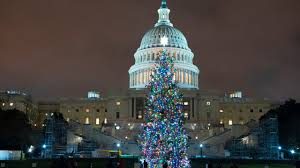
Democrats and Republicans Congress might have a different reason for cheering about the nearly 5,600 page COVID-19 relief and omnibus spending package passed this week.
While working under the headline of finally reaching agreement on $900 billion pandemic relief bill, both parties also came up with a $1.4 trillion spending package to fund the government through September and included a lot of energy projects that surprised some observers.
They managed to approve an estimated $35 billion in new energy efforts, one the Democrats call a “down payment” on climate change efforts. Of course, they did it with the help of Republicans too.
Their efforts not only included extended tax credits for wind and solar projects but a special effort to help offshore wind projects. Both sides reached agreement on a compromise to phase down the use of hydrofluorocarbons. Federally backed demonstration projects for geothermal, advanced nuclear, energy storage and direct air capture were also part of the so-called coronavirus relief measure.
POLITICO reports that the package would authorize tens of billions toward nearly every energy source. The news group said it includes an expansion of the Weatherization Assistance Program, a boost to energy efficiency programs for data centers, schools and federal buildings. There is even a set goal that federal lands produce 25 gigawatts of electricity from renewable energy projects by 2025.
Democrats managed to get in a strike at the oil and gas industry in New Mexico by limiting oil and gas drilling near the Chaco Culture National Historical Park.
But the Republicans also got one of their goals—prohibition of the Interior Department from issuing regulations for the greater sage grouse under the Endangered Species Act.
“We’ve accomplished this with a climate- and science-denying Republican president and a Republican party largely beholden to industry,” Minority Leader Chuck Schumer said of the entire bill.
Oklahoma U.S. Sen. Jim Inhofe was aware of the energy provisions which included his Diesel Emissions Reduction Act or DERA which is a federal grant and rebate program administered by the EPA to finance the voluntary replacement of existing heavy-duty diesel vehicles and engines.
But Sen. James Lankford wasn’t happy about the entire process calling it the “ugliest” he has seen during his time in Congress.
“This isn’t sustainable. Amendments were behind closed doors, arguments were conducted through the media and the bill grew larger the longer it stayed in the dark. This process needs sunshine,” he said in a statement from his office.
Congressman Tom Cole issued a statement about the relief package and the funding measure.
“While the resulting bill is massive and far from perfect, at the end of the day, it reflects the priorities and best interests of the American people for the months to come. Moreover, it prevents the added pain of a government shutdown amid the ongoing hardships our country and people have faced this year.”
Rep. Frank Lucas said, “Ensuring the government is responsibly funded assures the American people that vital programs are fully operational for the next fiscal year.”
Republican Rep. Kevin Hern of Tulsa was a little more blunt.
“This year, 10 one-sided appropriations bills passed the House, littered with poison pills. Because Pelosi was unwilling to work with Republicans, the bills never passed the Senate,” he said in a statement from his office.
Hern said some of the “unnecessary policy riders” were removed “maintaining the pro-life and 2nd amendment protections that are a top priority for me and my constituents.”
Source: POLITICO





